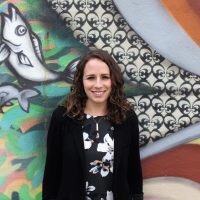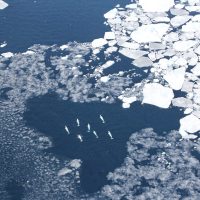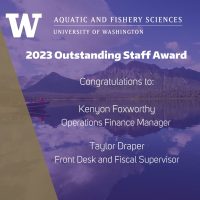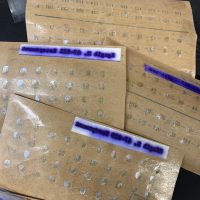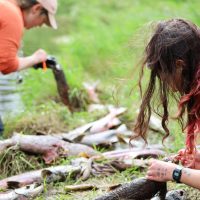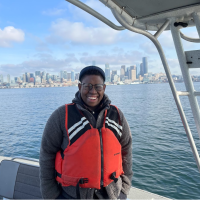Filter Results
Bringing the Seafood Globalization Lab to SAFS: welcome to Jessica Gephart
Joining SAFS as Assistant Professor in January 2024, Jessica Gephart brings to the school her expertise in global food trade systems. Always having an interest in scientific problems, Jessica started off her career in aquatic ecology and modeling before becoming involved in a side project in her lab at the time, focused on food systems and food trade. “I was interested in the modeling approaches that parallel these systems and realized that a lot of studies didn’t look at fish at all.
Read moreListening closely: using acoustics to study Greenland’s marine mammals
Recently completing her PhD focused on marine mammals in Greenland, Marie Zahn’s work in the Arctic provides a deeper look into two species: narwhals and belugas.
Conducting her research at the School of Aquatic and Fishery Sciences (SAFS) as a member of the Laidre Lab, Marie explored the marine habitat and sounds produced by narwhals and belugas using oceanographic and acoustic data collected from West Greenland.
Announcing the SAFS 2023 Outstanding Staff Award
This year’s Outstanding Staff Award has been presented to two exemplary colleagues who went above and beyond in their work in the face of a UW-wide financial system transition: Kenyon Foxworthy and Taylor Draper.
Based in the SAFS admin suite, Kenyon is the Operations Finance Manager and Taylor is the Front Desk and Fiscal Supervisor. Both have been recognized for their patience and perseverance with the roll-out of the new UWFT system.
Vital communications among the critically endangered Cook Inlet belugas may be masked by ship noise
New research led by SAFS doctoral student, Arial Brewer, documents the vocal repertoire of Cook Inlet beluga whales for the first time.
Read moreSalmon, scales, and spectrometry: analyzing historical fish scales to explore food web changes over time
For over 60 years, the Alaska Department of Fish and Game have collected scales from sockeye salmon in Bristol Bay. Now, these scales are receiving special treatment in a new project led by SAFS graduate student Grace Henry, who is conducting stable isotope analysis to examine how food webs in the North Pacific Ocean have changed since the 1960s.
Chemistry has always been Grace’s biggest interest: “I love chemistry, and for me, it’s the cornerstone of ecological science.” Working with stable isotopes in her pre-graduate studies, Grace wanted to use this method during her thesis work on food webs using historical archived samples.
Part 2 of our video series featuring the Alaska Salmon Program now live
Watch Part 2 of a summer with the Alaska Salmon Program, now live, featuring the students who are essential to the program.
Read moreStudying toxic metals in fish in southeast Asia’s largest freshwater lake
In the largest freshwater lake in southeast Asia, Shorna Sabikunnahar is looking into the ecological and environmental drivers of toxic metals in resident fish.
Conducting her research on Tonle Sap Lake in Cambodia, which is part of the Mekong River system, Shorna is a SAFS PhD student in the Holtgrieve Ecosystem Ecology Lab (HEEL). Designated as a Biosphere Reserve by UNESCO, Tonle Sap Lake is one of the most diverse and productive ecosystems on the globe.
Multiple lines and levels of evidence for avian zoochory promoting fish colonization of artificial lakes
Understanding how obligate freshwater organisms colonize seemingly isolated ecosystems has long fascinated ecologists, with new research co-authored by Flavien Garcia and Julian Olden demonstrating possible bird-mediated colonization of lakes by European perch.
Read moreDiving deep into how fish impact carbon cycling in the ocean
Recently featured in Hakai Magazine’s article “All The Fish We Cannot See”, SAFS PhD student Helena McMonagle is conducting a deep dive into a hidden cache of fish that might play an unexpected role in how the ocean sequesters carbon. We caught up with Helena to find out more about it.
Since starting this research in 2019, I’ve been using data collected at sea and in the lab, along with bioenergetic models, to estimate how much carbon these mesopelagic fish, such as lanternfish, transport from surface waters into the twilight zone.
Working with the Port of Seattle during a Washington Sea Grant Fellowship
Selected as the 2022–2023 Washington Sea Grant Keystone Fellow, Ashley Townes spent a year working with the Port of Seattle’s maritime habitat team on advancing the development and implementation of innovative habitat restoration projects including kelp research, fish sampling with underwater remote operated vehicles (ROVs) and 360-degree cameras, and bankline monitoring to survey the condition and character of shorelines at port facilities in the Lake Washington Ship Canal, Shilshole Bay, Elliott Bay, the East and West waterways and the Duwamish Waterway.
Read more